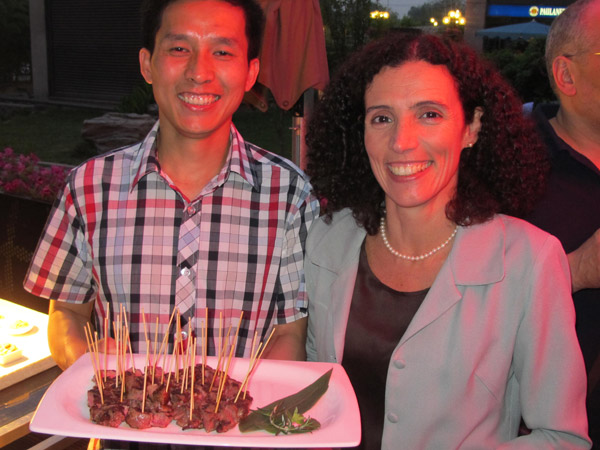Nation's appetite grows for meat from Uruguay
Updated: 2012-06-25 07:30
By Mike Peters (China Daily)
|
|||||||||||
On a recent spring evening, guests at a garden party hosted by Uruguayan meat and wine producers sighed with pleasure as chefs at a Beijing hotel grilled savory bites of beef strip loin, rib-eye steak, lamb shoulder and French-cut rack of lamb.
 |
|
Chef Tim Ding presents a platter of grilled beef strip loin to Rosario Portell, the Uruguyan ambassador to China, at a recent party in Beijing. The event was organized to promote Uruguayan meat, wine and other agricultural products. Mike Peters / China Daily |
Now Ambassador Rosario Portell said she hopes to capitalize on that high-profile event and showcase her country's meat industry as Premier Wen Jiabao arrived in Montevideo for a visit last week.
"Uruguay has been participating at the SIAL Fair in Shanghai - the biggest and most important food and beverage fair in Asia - for several years," she told China Daily. Immediately after the Beijing reception, she headed to this year's SIAL in Shanghai with a business delegation that included the leaders of the National Meat Institute of Uruguay. "We were exhibiting high-quality foodstuffs - wine, chocolate, olive oil - and specifically a strong presence and promotion of the beef sector."
Portell is confident that China is a ready market for Uruguay's meats. The country has already increased its sales of high-value beef cuts in China by a factor of 10 in the past three years, finding a niche in a market traditionally dominated by Australia and New Zealand.
"Three years ago, the market was negligible, with some sales of offal," said Fernando Perez Abella, vice-president of the meat institute. "Today it is at 8 or 9 percent of our exports and is equivalent to Israel, one of our traditional destinations."
Last year, Uruguay exported 11,610 tons of meat worth $43 million, he said, noting that China has already become the seventh-largest buyer in volume and No 12 in price. But as more affluent consumers in China demand more quality, he said, top-grade meats can command a premium price here.
Portell said her country has a special edge at a time when concerns about food safety are high.
"Uruguay is a country in the world with 100 percent cattle traceability," she said. The beef and lamb her guests were sampling in Beijing came from animals that were grass-fed, free range, with no hormones or antibiotics by law.
"Our beef is good for a low-fat diet because of the natural way the cattle are raised," she said. "And because they feed on natural pastures, the beef contains four times more Omega-3 and vitamin E than conventional steaks."
Portell, by the way, is putting her mouth where her money is. She's sending the embassy's Chinese chef, Tim Ding, to Montevideo for special training in preparing the country's particular types of meats.
Beef consumption in China still lags far behind pork and chicken, though middle-class tastes for Western food options have pushed consumption to about 4.5 kilograms per person each year. Pork consumption is about 37 kg per person annually, so analysts on both sides of the world see potential for growth. Like other South American countries, Uruguay produces more food than it needs to feed its people, so meat has become a key export market. Perez Alba said his country limits meat exports to about 200,000 tons, but of very high quality. That focus has made Russia a major buyer of Uruguayan beef, and Portell sees that marketing model working in China, too.
Perez Abella said that the strategy has been so successful that the meat institute plans to open a permanent representative office in Asia, and it might be in Beijing. Because the market is so important, a regional office will make the distance easier to deal with, he said.
Contact the writer at michaelpeters@chinadaily.com.cn
Today's Top News
President Xi confident in recovery from quake
H7N9 update: 104 cases, 21 deaths
Telecom workers restore links
Coal mine blast kills 18 in Jilin
Intl scholarship puts China on the map
More bird flu patients discharged
Gold loses sheen, but still a safe bet
US 'turns blind eye to human rights'
Hot Topics
Lunar probe , China growth forecasts, Emission rules get tougher, China seen through 'colored lens', International board,
Editor's Picks

|

|

|

|

|

|





